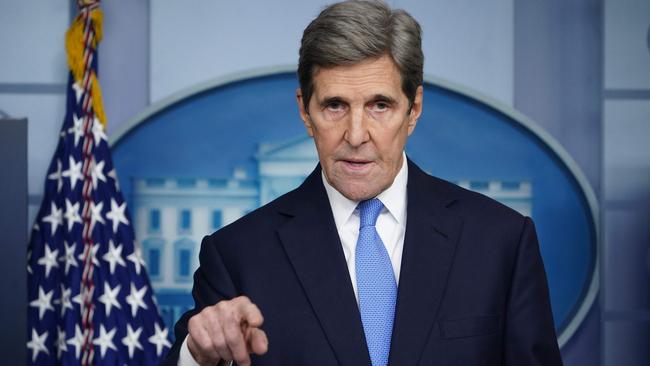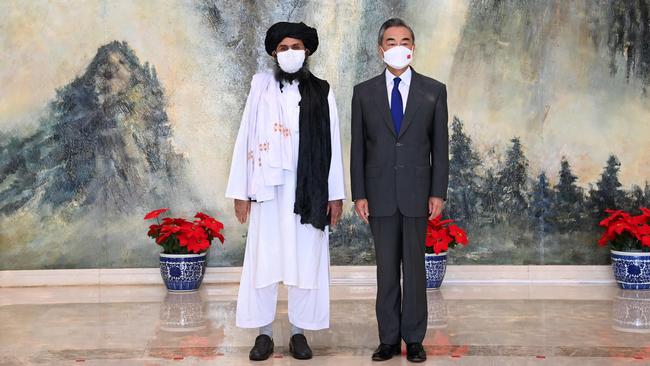
Suddenly after long periods of isolation, vital negotiations between the US and China are opening up. Next month we will see the return visit of US special climate envoy John Kerry to China to discuss strategies for the upcoming Glasgow climate summit in November.
The second negotiation is much more secret. Chinese military officials are meeting with their US counterparts to discuss the Afghanistan crisis, which has weakened US global influence but also has a significant impact on China.
First, climate. Australia has no governmental contacts with China so must rely on the US to discover outcomes from Kerry’s visit to China. It is possible that both the two largest world economies will reach a climate accord, or at least confine their differences. Australia cannot afford to go to Glasgow with a stance that is incompatible with China and the US. If we allow that to happen we face a grave risk of global trade sanctions - something China will delight in pushing.
While it’s clear that Kerry’s talks with China will focus on climate it is highly likely that other issues will at least be canvassed. China carefully analysed the recent US military manoeuvres in the South China sea and almost certainly will have come to the same conclusion as the US, that currently China has the military capacity to defeat the US in any military encounter involving Taiwan.
That knowledge of Chinese superiority plus the Afghanistan disaster means that Kerry will not “lecture” China, making it easier to isolate climate. It was many years ago but I have met John Kerry and he is not the “lecturing” type, which clearly shows he is someone the Chinese believe they can deal with. It’s a lesson for Australia.
Kerry was secretary of state under Barack Obama from 2013 to 2017 and was the first senior person in the Biden administration to visit China when he travelled to Shanghai in April. Then, in July, US deputy secretary of state Wendy Sherman also visited.
Kerry and his Chinese counterpart Xie Zhenhua released a joint statement, pledging to work together and with other countries to tackle climate change and vowed to develop long-term strategies aimed at net-zero greenhouse gas emissions and reducing non-carbon dioxide emissions, including a phase-down of airconditioning related hydrofluorocarbon .
China is under increasing pressure from climate advocates to bring forward its 2060 carbon neutrality target to 2050.
At the same time, China appears to making huge strides in the development of molten salt nuclear technology for its submarines and other shipping. Those technology breakthroughs may cause a change in its climate stance. In addition, China will have seen that Europe counts as a carbon credit burning wood, showing that the forecasts of others are suspect.
In regard to Afghanistan it is not widely understood that China had a deep interest in the US maintaining some form of stability in the area. Afghanistan is a key link in China’s Belt and Road initiative and the Chinese have funded substantial infrastructure projects in Afghanistan. China believes that elements of the Taliban have been responsible for attacks on Chinese engineers working on similar projects in Pakistan. It also believes that Islamic State in Afghanistan is behind terror attacks in Western China’s Xīnjiāng province.

Major General Huang Xueping, deputy director for the People’s Liberation Army Office for International Military Cooperation, and his Pentagon counterpart, Michael Chase, the deputy assistant secretary of defence, used the US-PRC Defence Telephone Link to conduct a secure video conference on Afghanistan.
According to Reuters, both sides agreed on the importance of maintaining open channels of communication between the two militaries.
Maybe something good will come out of Afghanistan. But it’s important for the Australian government to realise that now talks are taking place between China and the US both at the climate and military levels we are in danger of becoming more and more isolated.
As Paul Kelly set out in The Weekend Australian, the 70th anniversary of ANZUS is time to take another look at the agreement.
And finally, to mark that anniversary, I would like to again relate the story of the birth of ANZUS
Australia’s external affairs minister of 1950, Percy Spender, realised that Australia needed a long-term alliance with the US.
ANZUS was born because, after many knock-backs from US defence and foreign affairs people, Spender gained a 15-minute audience with US President Harry Truman.
For most of the 15 minutes Spender sympathised with Truman over the press’s treatment of his daughter’s singing performance the night before.
With only a few minutes of the 1950 Spender-Truman discussion time still left, Truman asked Spender whether there was anything specific Spender wanted. It was Spender’s chance. In those few minutes Truman agreed in principle to an Australia-US alliance and ANZUS was born.




While Australian debate centres on Covid-19 and the proposed ALP breach of tax confidentiality in the Senate, relations between the US and China have taken a sudden turn which may well impact on Australia.